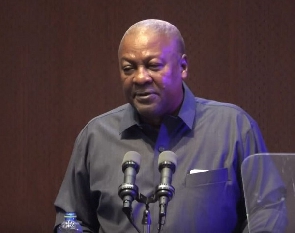Former president, John Dramani Mahama, has cautioned that Ghana’s potential debt restructuring exercise must not place the absolute burden on only the country's domestic debt. Ghana's public stock debt stock, according to the Bank of Ghana reached GH¢402.4 billion in July 2022, representing 68 percent of Gross Domestic Product. Although the figure has been projected by the World Bank to reach 104 percent by end the of 2022, John Mahama believes government must conduct the debt restructuring exercise in a manner that covers both domestic and external debt components. Speaking at a public lecture on Ghana's economy on October 27, the former president said the current economic conditions have since left many Ghanaians suffering with severe erosion of indigenous capital. “For us in the NDC, our position is that any debt restructuring must not place the absolute burden on only the domestic debt. Restructuring of our debt must cover both domestic and external debt,” he stated. He further pointed out the impacts of the banking sector clean-up exercise which he believes has resulted in job losses and erosion of capital for many Ghanaian businesses and families. It is for this reason, John Mahama wants government to conduct a proper debt restructuring exercise amid ongoing negotiations with the International Monetary Fund for a bailout. “Any debt restructuring restricted to cover only domestic creditors would lead to a further erosion of local savings and capital and would also severely weaken the Ghanaian banking sector,” John Mahama stressed. Meanwhile, Global investment bank and financial services firm, JP Morgan has warned Ghana’s potential debt restructuring exercise could further weaken the position of the local currency. According to the US-based firm, the development could be significant even if Ghana’s central bank increases or reverses its foreign exchange (FX) purchase policy results in the short-term to shore up the cedi. JP Morgan in a recent Emerging Market Quick Take touching on the recent performance of the Ghana Cedi, it attributed the decline to the Bank of Ghana’s decision to purchase dollars from mining and oil companies, inadvertently reducing forex availability within the inter-bank market. The global investment bank further attributed the loss of confidence in the domestic economy, which it believes has drained FX reserves and resulted in volatility. MA/FNOQ
Business News of Friday, 28 October 2022
Source: www.ghanaweb.com













